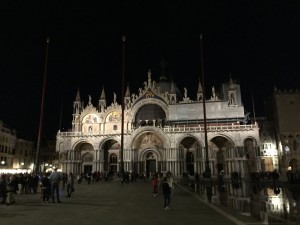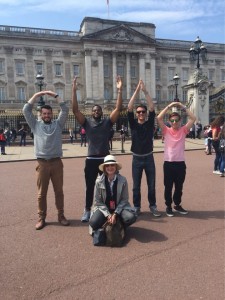I participated in the Psychology and Culture in Europe Program provided through the Department of Psychology in the College of Arts and Sciences. The program entailed myself and nineteen other students traveling to three European cities over two countries, London, England, Rome, Italy, and Venice, Italy. The program lasted from May 14 until May 30, and also required us to record a journal throughout the trip, of which we were checked up on everyday.
I never knew how eye-opening traveling across the Atlantic Ocean would be, I learned very much about myself and about the world as a whole. I learned how to adapt to new cultures and different languages; these cultures both expanded my worldview and helped me better appreciate the worlds and lives of those around me, who may or may not be very similar to me. Although these European countries are part of the western world, the cultures are vastly different than those in the United States, but I also believe it allowed us to look into the past and roots of our culture here in the United States, from the English parliament to the family dinner table in the heart of Rome. The two and a half week long trip also taught me a little bit about resilience; the program held twenty of us close together for extended periods of time and after a while, tensions did begin to increase, but I believe we all grew as social individuals in being able to work with each other.
The program entailed visiting three separate European countries each of which I believe provided their own cultures, challenges, and experiences. The first of which was Rome, which the first challenge was getting from the Rome airport to the hotel, which was an approximately forty minute drive, without knowing any Italian. Luckily, I was with a few other students in the group and we were able to work together and find a respectable service to get us to the hotel without succumbing to the predatory taxi services in Rome. The first few days in Rome were a large challenge and required a large cultural learning curve. In particular, I found the use of the metro as initially a challenge and further along one of our greatest assets for getting around the city. Rome also taught us a lesson on vigilance and impulse control; the city is infamous for their pickpockets and aggressive salespeople, our guide emphasized well and helped us treat these people with respect but not be taken advantage of. The Roman culture and history was almost overwhelming by how rich and deep it is; from the Roman Forum, to the Colosseum, to the Trevi Fountain. The list can go on, each of which possessed their own history and learning experiences.
The second city was iconic Venice, Italy, which was a complete change of pace from fast paced Rome. Compared to Rome, Venice felt as if it were a resort town, the endless winding canals, small alleyways filled with restaurants, and large openings for storefronts makes the viewer feel as if they are in another, simpler, world. The history of Venice is just as rich as that in Rome, while also providing its own challenges. I found it much easier to become lost in Venice, and found it to be disorienting at times, but in a sense, I enjoyed it; I found it fun and eye-opening to let Venice allow me to see the beaten path, not just the commercialized parts. I especially found visiting St. Mark’s Basilica especially interesting; the sight floods days, but still has stood for centuries. I found this amazing to the resilience of human innovation and their reverence for things thought to be sacred.
Finally, the third city I visited was London, England; the most modern and vertical city of all three. Additionally, I found London to be vastly different from both Rome and Venice, in culture, language, function, and diversity. By the time we had made it to London, we were all very tired, but I feel the city rejuvenated us across the board. There was so much to experience, if you took a moment off, you felt that you were missing out. London was much more diverse in terms of the types of people in the population overall than that first two cities, which I think assisted in the vast spectrum of cultures and traditions in a “global” city such as London. I also felt the lack of a language barrier allowed the overarching culture of the city to be more readily available to myself and others, allowing for a much smaller adjustment period than the ones needed for either Rome or Venice. London felt to be the most familiar of the three cities; yet completely new. In London, we were able to see sights which played massive roles in the development of modern science, including the homes of Charles Darwin, and Sigmund Freud; it brought the scientific world “full circle” while also showing these massive figures were also regular humans whom lived their own lives, creating a newfound appreciation for the work they did.
I believe the Psychology and Culture in Europe program and STEP’s assistance in making my participation viable has contributed greatly to both my personal and academic growth. This development stems primarily from the ability to experience the field of psychology in ways not typically presented here in the United States, while also seeing where many of the modern methods have stemmed from firsthand. Furthermore I grew personally from this program because of its ability to expose us to cultures different from that of my own, and encouraging us greatly to adapt and adopt those cultures instead of staying inside our comfort zone of american culture; through this we gained the appreciation of those age-old traditions and came to realize that anything different from our culture does not deserve to be judged against it, but treated as its own entity and to be treated with reverence and respect. With this newly further developed respect for culture and science, I believe it will assist me greatly in being a pragmatic observer and not rush to unhealthy decisions academically, personally, or in the future in my hopeful career in the field of psychology.



I’m glad to hear that stepping outside of your comfort zone developed your resiliency and understanding for those different from yourself! Furthermore, it’s great that you are now committed to healthier decisions moving forward.